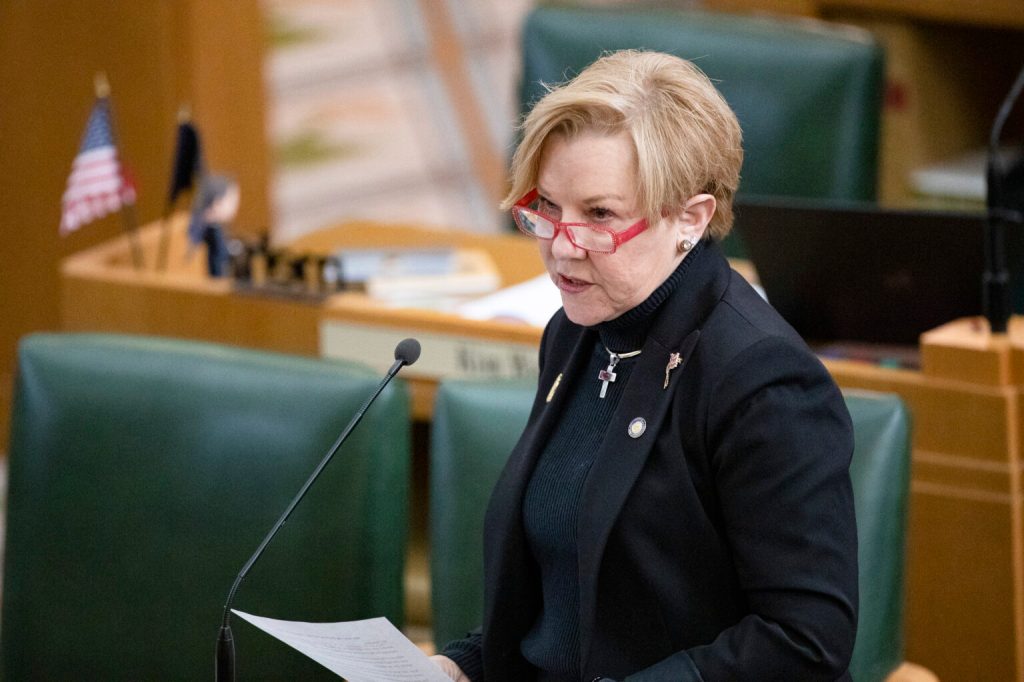State Rep. Bobby Levy weighs in on bills close to family business while lawmakers weigh regulations
Published 4:24 pm Tuesday, May 27, 2025

- Rep. Bobby Levy, R-Echo, works on the House floor at the Oregon State Capitol in Salem on Tuesday, Feb. 28, 2023. (Amanda Loman/Oregon Capital Chronicle)
The Republican from northeast Oregon testified against bills related to fertilizer and data centers that could impact her family’s businesses
On Feb. 5, state Rep. Bobby Levy, R-Echo, urged legislators at a hearing in the Senate Committee on Natural Resources and Wildfire to oppose a bill that would have required large farm owners to report their fertilizer use to the Oregon Department of Agriculture. The goal of the bill, which died in the committee after the hearing, was to help curb groundwater pollution that’s become a growing issue in Levy’s district in northeast Oregon.
“Making the suggestion that over application (of fertilizer) is widespread is both inaccurate and unfair,” she told the senators.
A month later, the Oregon Department of Environmental Quality identified “the Levy farm” in a citation as having over-applied fertilizer on corn fields owned by the family’s business throughout 2023, causing pollution to waters of the state, in an already contaminated aquifer.
Levy’s opposition to the fertilizer reporting bill — Senate Bill 747 — did not include any mention of her own farmland holdings or the income she gets from her family business, Windy River, proprietor of those fields of corn.
“Workers and families with polluted drinking water need good representation on this issue and aren’t getting it,” Kaleb Lay, policy director at Oregon Rural Action, said via text. “We’re going to need leadership from the legislature to hold polluters accountable in the Lower Umatilla Basin.”
Although Levy has named seven businesses in the statement of economic interest she submits annually to the Oregon Government Ethics Commission, Levy isn’t barred from sponsoring, testifying on or voting on bills that would directly benefit the family businesses that she receives income from.
In fact, by Oregon law, she said she and other legislators are required to vote on bills even when they’ve declared a conflict of interest.
“As a member of the House of Representatives, it is my honor and obligation to comply with the rules of the House, state law and the Oregon Constitution,” Levy said in an email. “House rules require me to attend all committee meetings unless I am excused. House rules require me to vote and prohibit me from abstaining from voting. If I am faced with an actual or potential conflict of interest, House rules require me to announce the nature of the conflict prior to voting on the issue that is creating the conflict.”
Kate Titus, executive director of Common Cause Oregon, a nonpartisan, nonprofit group focused on public policy in the state, said many other states have laws that recommend or require lawmakers to abstain from voting on bills where they’ve declared a financial conflict of interest.
“Oregon is behind on these ethics laws,” Titus said.
Two bills currently being considered by legislators would change that and offer more transparency.
Senate Joint Resolution 9, sponsored by state Sen. Fred Girod, R-Stayton, would refer a ballot measure to Oregon voters in November to decide whether to amend the state constitution to prohibit legislators from voting on bills when they’ve declared a conflict of interest. Little action has been taken on the proposal, which has been sitting in the Senate Rules Committee since January.
Another proposal, made at the request of Gov. Tina Kotek for the Oregon Government Ethics Commission, would expand Oregon’s conflict of interest laws to apply to other members of a public figure’s household. This means officials would need to declare conflicts of interest not only if they or their business would materially benefit or suffer from a bill, but if it would benefit or damage a relative or a member of the official’s household, or any businesses associated with relatives or members of the household.
The proposal — House Bill 2930 — unanimously passed the House in April and is awaiting a final vote in the Senate.
Power brokering
The interests of Levy’s family businesses also hew closely to a bill she’s sponsoring and another she’s opposed, related to power and data centers.
Levy is sponsoring a bill that would exempt Umatilla County from Oregon’s 45-year-old statewide nuclear ban — an exemption that would favor tech companies already investing billions in small nuclear reactors in the region to power their growing number of energy-hungry data centers and AI processing servers.
She also opposed a bill that would create a separate rate class for data centers to ensure costs of grid and infrastructure expansion needed to power them aren’t passed onto utilities’ residential customers.
Demand for power from the Umatilla Electric Cooperative, which supplies electricity to much of Levy’s district, has grown 556% in the last decade, according to recent analysis by the nonprofit research organization Sightline Institute. Nearly all of that is from Amazon data centers in the county.
Levy did not disclose while she lobbied for and against these bills that the family business Windy River has made deals with Amazon, including selling the company more than 100 acres of its land in 2021 for nearly $3.7 million, to build a new data center that is nearing completion. Windy River still holds the water rights to that land.
Levy also did not share that Windy River’s farm acres get wastewater to use for irrigation from another Amazon data center, according to the Port of Morrow’s most recent wastewater permit.
Oregon law does require disclosures of donations to public officials’ campaigns, which show Levy accepted a $2,000 donation from Amazon in November. The company gave similarly sized donations to a number of lawmakers from both parties in 2024.
Levy contends she did not need to declare a conflict of interest related to the Senate bill that would have required fertilizer reporting because it never went to a vote.
The only reason the environmental quality department knows about the overfertilized fields at the Levy farm is because the farm gets wastewater from J.R. Simplot Company and the Hermiston Power Plant. J.R. Simplot has a state-regulated wastewater permit that allows it to supply the Levy farm with wastewater, and in return Simplot is required to report how much fertilizer farmers are laying down on those wastewater-irrigated fields, and to allow DEQ to test wells nearby the farm fields for contaminants.
Windy River, the Levy family’s company, is now trying to stop receiving water from Simplot, meaning their fields would no longer be monitored under Simplot’s state-regulated wastewater permit, and DEQ would no longer be able to monitor Windy River’s fertilizer use.
Levy said the other bills currently being considered do not require disclosures because they do not and will not directly financially benefit her or her family’s businesses, and that she is following all of Oregon’s ethics laws.
“The founders of this great state had the wisdom to enshrine in our constitution protections to ensure that legislators have the freedom to engage in robust debate in determining what laws to enact, without fear of being questioned by others outside of the legislature about what is said in that debate,” she said. “This protection enables me to advocate for the interests of my constituents to the best of my abilities, without fear of malicious prosecution by those who do not hold my constituents’ best interests to heart.”
Titus said regardless of Oregon’s ethics laws being behind the times, public officials should strive for a high degree of transparency and disclosure.
“At some level, you can’t fault legislators for playing by the rules, but it’s important that elected officials uphold the highest standards of transparency,” she said. “We elect legislators because they have expertise that represents our community, or certain experiences in our communities. We don’t want to prevent them from voting on things that broadly affect them, too. But at some point, when it’s related to a very specific private, economic interest, they should need to recuse themselves.”






